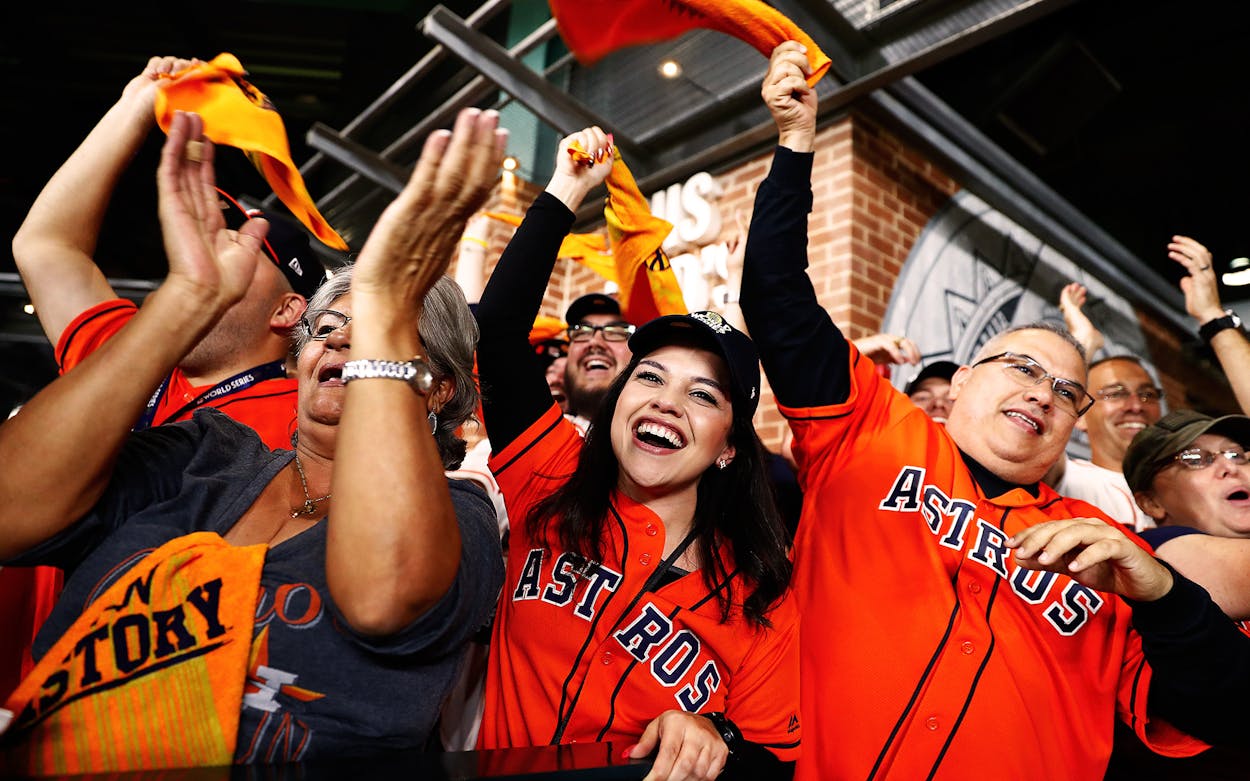On Tuesday, the Houston Astros play the Los Angeles Dodgers in game six, continuing their first appearance in the World Series since their loss to the Chicago White Sox in 2005. The games also mark the second major sporting event to take place this year in Houston, after Super Bowl LI in February. Large events such as the Super Bowl and the World Series bring increased economic activity with them—but not all sports championships have the same effect on a host city. The World Series brings in less money than the Super Bowl, but the games will impact Houston beyond economic support.
Patrick Jankowski, the Senior Vice President of Research for the Greater Houston Partnership, explains that the difference between the economic impact of the World Series and the Super Bowl comes from the planning for both events. With the Super Bowl, cities know years in advance that they’ll host the event, giving them, advertisers, and fans ample time to plan. But the two cities hosting the World Series must host a minimum of four games between them on short notice.
“You don’t have the opportunity for that sort of build up,” Jankowski says. “I would guess that 90 percent of the people who attend the World Series games in Houston are Houstonians.”
In February, the Super Bowl LI brought in $428 million of spending to Houston, largely due to travel expenses from 150,440 visitors. After factoring in numbers from the ripple effect of regular seasonal travel to Houston that was displaced because of the Super Bowl, the Houston Super Bowl Host Committee estimated that the total contribution of Super Bowl LI was $347 million. Over a period of ten days, the 150,440 visitors spent $292 million in the city, averaging $502 per day compared to the regular Texas average of $130 a day. 32 percent of that spending went to hotels, 21 percent to food and drink, 20 percent to entertainment, 16 percent to shopping, and the remaining 11 percent went to transportation.
Travis Adair, one of the owners of Lucky’s Pub, a sports bar with a location in downtown Houston, says the bar has had a busy year hosting events for both Super Bowl LI and the World Series. The Super Bowl brought seven to ten days of different events and activities to the bar and the surrounding area. Adair estimates that each day there was anywhere from 1,000 to 2,000 people visiting the bar, especially since Lucky’s Pub is the official Houston viewing place for the New England Patriots and has hosted tapings for ESPN shows like Mike & Mike and First Take. But because Houston’s hometown team is playing in the World Series, Adair says he sees an energy similar to that from the Super Bowl at their bar from local fans.
“Basically any time we have a home game, or for all seven of the [World Series] games, it’s like having a Super Bowl,” Adair says. “We have that same buzz everyday there’s a game.”
Economic data isn’t yet available for the ongoing games, but using the 2015 World Series reports from Kansas City and New York, Jankowski estimates that the World Series may have a $20 to $30 million impact on the local economy. That’s less than from the Super Bowl, and is supported by Adair’s experience. The bar owner says that although there are out-of-town fans spending money around Houston, he saw a big difference between the number of visitors he saw during the Super Bowl and during the World Series, adding that people may not have been able to get to Houston quickly. That difference is reflected in attendance numbers, too, as the Super Bowl game itself attracts more fans than the World Series does: 70,807 people attended Super Bowl LI at NRG Stadium, compared to 43,300 at game five of the World Series, despite significantly higher ticket prices for football.
The World Series may not bring as much of an economic boom, but it will certainly make a social impact on the city. “Ironically the only real impact of a mega-event is the intangible meta-networking or water cooler effect that unites all of Houston and South Texas, especially after the recent devastation from Hurricane Harvey,” said John Vrooman, a sports economics professor at Vanderbilt University.
Jankowski had a similar observation, noting that the Astros playing in the World Series benefits Houston’s image by taking the conversation away Harvey. “In this case you’ve got this wonderful image of the city being projected to fifty million people, as opposed to six weeks ago with an image of the city under water,” he says.
“This is a special team,” Adair explains. “Houston is a very diverse, international city. It’s a big city, but it’s also a small city: No matter where you go, people kind of know each other. With all we went through with Harvey and with all the different things we’ve gone through together as a city with the #HoustonStrong movement, what we’ve had to do as a community, I think the team represents that.”
If the Astros win the World Series, it would be their first championship since they were established in 1962. For Astros fans, especially those in Houston, the win would be a long time coming—and for the rest of the world, it’d show the resilience of a city devastated by a storm, and of a team that has surpassed everyone’s expectations.








